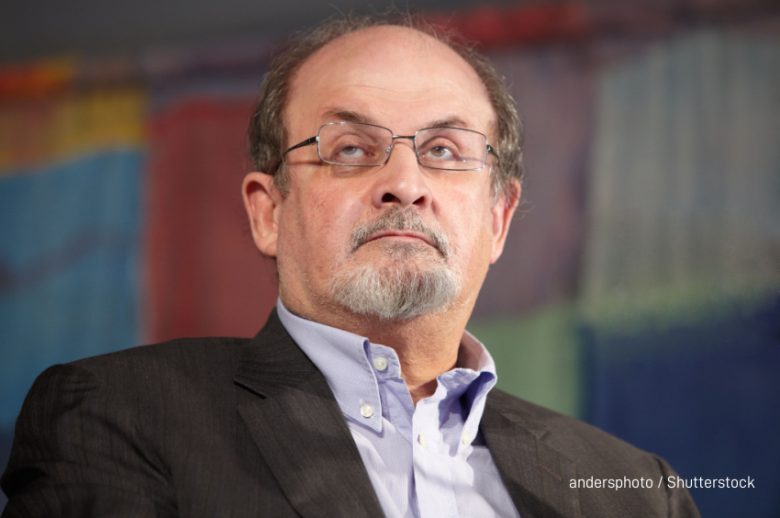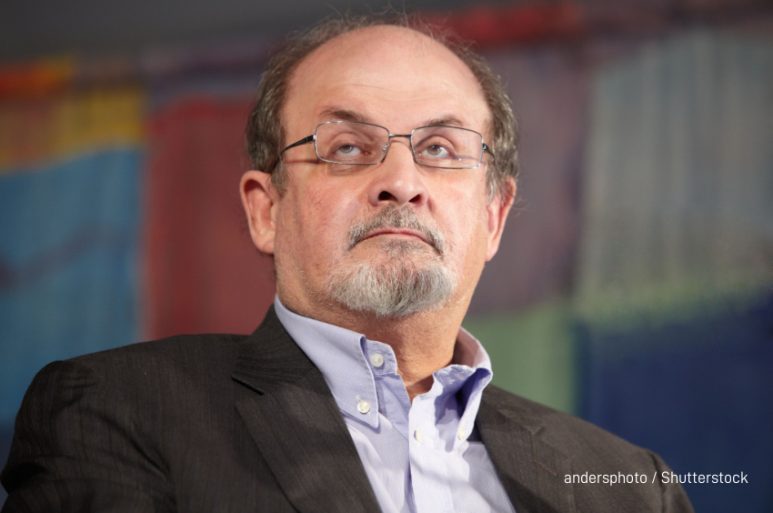By Dina Newman
The violent attack on Salman Rushdie, the author of The Satanic Verses, at a free speech event in New York State, came as a shock to everyone: to the audience, the organisers and, most importantly, to the 75-year-old author. A fatwa calling for his death had been issued as far back as 1989, and Iranian authorities have since indicated that they were not going to act on it. Salman Rushdie gave up round-the-clock police protection some years ago, even though the risk always remained that a lone attacker could act on the murderous ruling.
The suspected attacker, a US-born Hadi Matar, pleaded not guilty, and little is known about his motives at this point.

So far Western media have expressed concern about Rushdie’s well-being and condemned the violent attack, while commentators have revived the debate around Islam as a threat to Western liberal values and free speech.
Salman Rushdie: Three Decades of Controversy
Salman Rushdie is widely seen as a brave and principled defender of the freedom of speech. At the same time, many Muslims view his novel, The Satanic Verses, as a blasphemy against Islam.
Islamic scholars in the West have been trying to resolve this apparent contradiction in order to answer a more fundamental question: is Islam compatible with a secular liberal culture?
Shabbir Akhtar, a British Muslim philosopher, is described as a Sunni Orthodox Muslim.
In his book, “Be Careful with Muhammad! Salman Rushdie and the Battle for the Free Speech”, written soon after the fatwa was issued and republished in 2020, he points out that many Muslims in the Western world see themselves as marginalised, discriminated against and powerless. In this context, any mockery of Islam or the Prophet runs the risk of being more than a religious violation: it turns into an attack on a powerless minority. “Speak the truth to the powerful – by all means. But why mock powerless, voiceless Muslims whose only source of solace, self-esteem and indeed identity is traditional Islamic beliefs and values?” asks Dr Akhtar.
An American sociologist and author of Iranian descent, Ahmad Sadri, identifies as a classic liberal and a Muslim reformer. In an interview to MDI, he says: “I don’t approve of insulting religion, and I don’t approve of what Rushdie said in his novel. But, my advice to Muslims and people of all religions is that they should develop a thicker skin”.
Is his advice “un-Islamic”? Far from it, says Prof Sadri. He points to a tradition of tolerance within Islam, which was there before the rise of Islamic fundamentalism in the modern age.
Prof Sadri cites the example of a medieval Persian physician and scientist, al-Razi, who lived in the Islamic Golden Age and was known for his free thinking. According to contemporaries, he wrote two “heretical” books: “On Prophecies”, and “On the Tricks of False Prophets”. Despite his controversial views, al-Razi was free to write, explore and share his ideas in public debates. He is now considered one of the great figures in the history of medicine.
Today, commentators point out that the fatwa calling for the death of Salman Rushdie had nothing to do with religion or the rules of Islam. Iran’s Supreme Leader Ayatollah Khomeini had never even read Salman Rushdie’s book. He issued his murderous edict for political reasons, to deflect attention from the challenges facing Iran and the failures of its Islamic Revolution.
Does Anyone in the Muslim World Support the Attack on Salman Rushdie?
The pro-regime media outlets in Iran, Iraq and pro-Iranian outlets in Lebanon have expressed their support, but also some concern about the attack.
This is the reaction from political Shia circles. However, Prof Sadri believes that most people in Iran are disenchanted with the Islamic Republic and political Islam.
“There is no grassroots political fundamentalism in Iran. Few people are aware of this”, he says. He quotes two sociological studies which show a radical change in the attitude towards religion in Iran since the days of Islamic Revolution.
“In 1978, 98 per cent voted to confirm Islamic Republic in Iran, but now only about 10 per cent would vote for that. Iranian people are massively disenchanted with the government of God.”
This does not mean they are atheists, says Prof Sadri.
“Their religion has become ritualised, more private. People still observe religious traditions, like Muharram, but these are not political”.
Is Islam A Threat to Western Liberal Values?
In the West, academics argue that the danger comes not from the faith of Islam, but from the risk of radicalisation for second and third generation Muslims, if they feel marginalised and struggle to find an identity. Ignorant about the faith of their ancestors, they may be attracted to simplistic and radical rhetoric.
“There is no theological remedy for this”, says Prof Sadri.
“Fundamentalism is the disease of all major religions right now”.
In his view, preventing radicalisation is the responsibility of Muslim communities as much as of the societies which need to address racism, marginalisation and discrimination.
Dr Akhtar is also concerned about the Western bias against the Islamic faith. In the preface to the second edition of his book “Be Careful with the Muhammad!”, he calls on contemporary Islam to be seen as an indigenous faith, not a foreign transplant. “This informal and internalised recognition for the dignity of our Prophet within culture, art, literature and the moral values of the West… would enable cohesion and harmony in societies that aspire to be mature democracies”, he writes. He also calls on Muslims to show respect not only for people of other faiths, but also for people of the secular humanist tradition.
Photo Credits: andersphoto / Shutterstock

